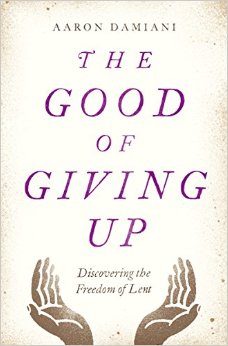Aaron Damiani, The Good of Giving Up: Discovering the Freedom of Lent (Chicago: Moody, 2017).
Today is Ash Wednesday, the first day of Lent, a 40-day season of fasting formalized by the Council of Nicea is A.D. 325, though based on precedents from the second century onward. Lent is observed by many, though not all Christians. Indeed, during the Reformation, Protestants objected to the way the Roman Catholic Church had turned Lent (and many other Christian traditions) into a form of works-righteousness. Some Reformers worked to restore Lent to its original purpose (e.g., Anglicans and Lutherans), but others dispensed with it entirely (e.g., the Reformed and Anabaptists).
As a Pentecostal, I belong to that wing of the Reformation that dispensed with Lent (and many other Christian traditions) entirely. And yet, over the past few years, I have found myself fasting something for Lent—whether a food item or an activity—to focus more closely on Jesus Christ. Not only that, I have found fellow Pentecostals picking up other Christian traditions that they find helpful to the life of the congregation. At church I attend, for example, we observe Advent the four Sundays leading up to Christmas.
Please don’t misunderstand me! Pentecostals have no biblical obligation to observe Christian traditions. Both Jesus Christ and the apostle Paul warned about the potential abuse of human traditions. To the Pharisees and scribes, Jesus said, “You have let go of the commands of God and are holding on to human traditions” (Mark 7:8). And Paul said, “See to it that no one takes you captive through hollow and deceptive philosophy, which depends on human tradition and the elemental spiritual forces of this world rather than on Christ” (Colossians 2:8).
By the same token, however, the Bible doesn’t prohibit Christians from observing traditions simply because they’re traditional. Jesus himself, for example, participated in “the Festival of the Dedication” (John 10:22), better known to us today as Hanukkah, a festival that celebrated the dedication of the Jerusalem temple in 164 B.C. and thus came into being well after the final book of the Old Testament had been written. Similarly, most Pentecostals hold special services on Christmas and Easter, even though the New Testament nowhere commands us to set aside December 25 or one Sunday in spring to commemorate Jesus’ birth and resurrection, respectively. The crucial question of any tradition is whether, to use Paul’s language, a tradition is based on merely “human tradition” or “on Christ.”
With that in mind, I’m happy to recommend Aaron Damiani’s The Good of Giving Up, a short book about Lent. Damiani is an evangelical Anglican and pastor of Immanuel Anglican Church in Chicago, Illinois. The book is published by Moody Publishers, a reputable evangelical book company also in Chicago. Damiani divides his book into three sections: (1) “The Case for Lent,” which includes answers to common evangelical objections to Lent; (2) “The Path of Lent,” which focuses on making Lent a season of focused fasting, prayer, generosity, and confession of sins; and (3) “Leading Others through Lent,” which offers practical guidelines for leading children and congregations through the Lenten season. Throughout the book, he focuses on how Lent helps us better experience the gospel of Jesus Christ, and he is very attentive to the work of the Holy Spirit in helping us fast, pray, give generously to others, and confess our sins. As a Pentecostal, I was especially heartened by repeated references to the work of the Holy Spirit.
Again, no Christian is biblically obligated to observe the tradition of Lent. Even so, Aaron Damiani shows why this season of prayer, fasting, generosity and confession is a good idea, and how you and the church you lead might put it into practice.
_____
P.S. If you found my review helpful, please vote “Yes” on my Amazon review page.
P.P.S. This review is cross-posted at InfluenceMagazine.com.

